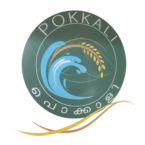Significance of Pokkali Rice

Resilience to Salinity and Flooding :
Thrives in saline conditions and can withstandsubmergence for over a week, making it a climate-resilient crop.

Eco-friendly Farming System:
Integrated Pokkali-Prawn farming supports sustainable,organic agriculture by combining rice cultivation with prawn farming, conserving biodiversity

Geographical Indication (GI) Tag:
Received the GI tag in 2008–2009, safeguarding its authenticity and providing economic benefits to farmers.

Genetic Contribution:
Pokkali serves as a valuable donor variety in international breeding programs, contributing genes for salt tolerance and submergence resistance. Research at the University of Arizona and Okayama University has demonstrated Pokkali’s genetic significance. Notably, Okayama University identified the duplication of the OsNramp5 gene in Pokkali, which minimizes cadmium accumulation in rice grains without affecting yield or quality. This discovery enhances food safety and reinforces Pokkali’s role in addressing global agricultural challenges.

Economic and Cultural Value:
Pokkali farming sustains the livelihoods of coastal farming communities and preserves age-old agricultural traditions. Its high nutritional value and organic cultivation methods position it as a premium product in both domestic and international markets, providing economic upliftment and enhancing cultural identity.

Sustainability:
The Pokkali farming system aligns effectively with sustainable development goals by fostering environmentally friendly practices, minimizing carbon emissions, and supporting climate adaptation. As a resilient and sustainable crop, Pokkali plays a vital role in addressing food insecurity in saline-affected regions worldwide. This traditional farming method enhances climate resilience by sequestering carbon and lowering methane emissions. With rising sea levels endangering coastal wetlands, Pokkali’s integration of agriculture and aquaculture offers a sustainable solution for protecting these ecosystems while ensuring livelihoods.
Need for Pokkali Farming

Wetland Conservation
Protects Kerala’s wetlands, which act as natural sponges for flood
control, water purification, and biodiversity conservation

Avifauna Habitat
Preserves habitats for migratory birds and supports the wetland
ecosystem as an Important Bird Area (IBA).

Boosting Rice Production
Promotes organic rice production in stress-prone areas to meet
demand and contribute to sustainable agriculture.

Climate Adaptation
Enhances climate resilience by sequestering carbon, reducing methane
emissions, and supporting sustainable livelihoods in coastal regions.

Organic Farming Revolution
Supports the shift to organic farming practices, fostering an
evergreen revolution in rice cultivation.
